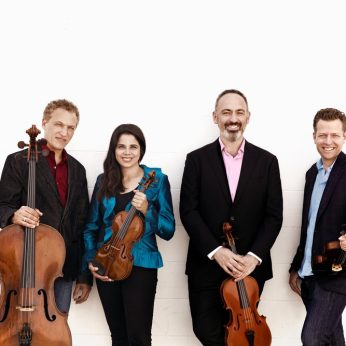Composer: Wolfgang Amadeus Mozart (b. 1756 - d. 1791)
Performance date: 23/06/2023
Venue: Bantry House
Composition Year: -1
Duration: 00:28:30
Recording Engineer: Tom Norton, RTÉ
Instrumentation: 2vn, va, vc
Instrumentation Category:String Quartet
Artists:
Pacifica Quartet (Simin Ganatra, Austin Hartman [violins], Mark Holloway [viola], Brandon Vamos [cello]) -
[String Quartet]

String Quartet in C major K.465 ‘Dissonance’
1 Adagio – Allegro
2 Andante cantabile
3 Minuet – Allegro and Trio
4 Allegro molto
This is the last of the set of six string quartets known as the ‘Haydn Quartets’, which Mozart wrote between 1782 and 1785. In 1781, Haydn, the founder of string quartet composition, wrote his Opus 33 set of six quartets ‘in an entirely new and special style’, and Mozart was so powerfully affected by them that he was inspired to spend more time composing chamber music. Mozart published the six quartets with a long, highly personal and revealing dedication to Haydn: ‘… Here they are then, O great Man and my dearest Friend, these six children of mine … the fruit of long and laborious endeavour … You yourself, dearest friend, told me of your satisfaction with them during your last visit to this capital … May it therefore please you to receive them kindly and to be their Father, Guide and friend! …’
In February, 1785 Haydn and Mozart’s father Leopold were present at a quartet evening at which some or all of Mozart’s six new quartets were played, and Haydn, the most celebrated composer in Europe, said to Leopold, Before God, and as a man of honour, I tell you that your son is the greatest composer known to me either in person or by name. He has taste, and what is more, the most profound knowledge of composition. The long and laborious endeavour was because Mozart had abandoned the easy Italianate style of his earlier quartets and these, his first mature string quartets, required much correcting and re-working. But one result was that he learned to think in four parts at will, instead of in terms of harmonised melody, and all the quartets have a spontaneous freshness and a wonderfully fluent technique.
The Dissonance Quartet is so named on account of the slow introduction to the opening Allegro. The harmonic structure of the texture of the opening bars – a chromatically descending bass – is not extraordinary even in the context of the eighteenth century. But Mozart uses a series of false relations in the first eight bars to blur the tonality and to generate tension about how he will untangle the deliberately tangled skein. Like Wagner’s Tristan chord, these few notes have been the cause of much erudite and impassioned debate – indeed many early performers even corrected what they thought were Mozart’s mistakes. The Allegro when it arrives is of crystalline beauty, clear in structure and shining with joy. The only darkness amidst this light-filled music comes in the development when the cello seems to be dragging us back to the tensions of the opening introduction.
The Andante cantabile is one of Mozart’s most intensely beautiful creations. Perhaps its most affecting inspiration is a sighing figure that is passed magically amongst the four instruments. As the movement progresses the music is transformed from gentle beauty into a profundity that no words can reflect. Inevitably the Minuet must bring us back to ground level with a combination of earthiness and spirited energy. The Trio is led even more energetically by the first violin with some neat interjections by the cello near the end. The Finale is clearly written in homage to Haydn as it uses several techniques pioneered by him, such as the sudden rests in the main theme used to build up tension. The second theme has a tendency to burst out into a cascade of brilliant semiquaver runs followed by an uneasy dream-like episode. Another trick of Papa Haydn’s was the false entry of the recapitulation, which Mozart tries three times before eventually finding the correct key. So does the youthful master make obeisance to his mentor, while we listen transfixed.
Francis Humphrys
Copyright © 2025 West Cork Music. All rights reserved.
Designed and developed by Matrix Internet